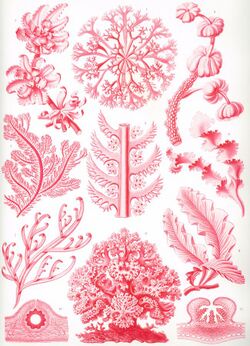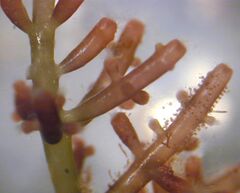Biology:Florideophyceae
| Florideophyceae | |
|---|---|

| |
| "Florideae" from Ernst Haeckel's Kunstformen der Natur, 1904 | |
| Scientific classification | |
| (unranked): | Archaeplastida |
| Division: | Rhodophyta |
| Subdivision: | Eurhodophytina |
| Class: | Florideophyceae Cronquist, 1960[2] |
| Subgroups | |
|
See text. | |
Florideophyceae is a class of exclusively multicellular red algae.[3][4] They were once thought to be the only algae to bear pit connections,[5] but these have since been found in the filamentous stage of the Bangiaceae.[6] They were also thought only to exhibit apical growth, but there are genera known to grow by intercalary growth.[6] Most, but not all, genera have three phases to the life cycle.[6]
Classification

There are various classification schemes; see red algae. One option is to use the following:
Subclass Hildenbrandiophycidae
Subclass Nemaliophycidae
- Acrochaetiales
- Balbianiales
- Balliales
- Batrachospermales
- Colaconematales
- Nemaliales
- Palmariales
- Entwisleiales
- Thoreales
Subclass Corallinophycidae
- Corallinales
- Corallinapetrales
- Rhodogorgonales
- Sporolithales
The subclass Corallinophycidae was introduced in 2007.[7]
Subclass Ahnfeltiophycidae
- Ahnfeltiales
- Pihiellales
Subclass Rhodymeniophycidae
- Bonnemaisoniales
- Ceramiales
- Gelidiales
- Gigartinales
- Gracilariales
- Halymeniales
- Nemastomatales
- Peyssonneliales
- Plocamiales
- Rhodymeniales
- Acrosymphytales
- Atractophorales
- Catenellopsidales
- Sebdeniales
According to molecular clock analysis, Florideophyceae diverged from other red algae about 943 (817–1,049) million years ago. It split into Hildenbrandiophycidae ca. 781 (681–879) mya, Nemaliophycidae ca. 661 (597–736) mya and Corallinophycidae ca. 579 (543–617) mya, and ca. 508 (442–580) mya the split between Ahnfeltiophycidae and Rhodymeniophycidae occurred.[1]
References
- ↑ 1.0 1.1 Divergence time estimates and the evolution of major lineages in the florideophyte red algae - Nature
- ↑ Cronquist, A. (1960). "The divisions and classes of plants". The Botanical Review 26 (4): 425–482. doi:10.1007/BF02940572.
- ↑ Yoon, Hwan Su; Muller, Kirsten M.; Sheath, Robert G.; Ott, Franklyn D.; Bhattacharya, Debashish (April 2006). "Defining the Major Lineages of Red Algae (Rhodophyta)1" (in en). Journal of Phycology 42 (2): 482–492. doi:10.1111/j.1529-8817.2006.00210.x. ISSN 0022-3646. http://doi.wiley.com/10.1111/j.1529-8817.2006.00210.x.
- ↑ Signatures of Transcription Factor Evolution and the Secondary Gain of Red Algae Complexity - NCBI
- ↑ Dawes, C. J.; Scott, F. M.; Bowler, E. (1961). "A Light- and Electron-Microscopic Survey of Algal Cell Walls. I. Phaeophyta and Rhodophyta". American Journal of Botany 48 (10): 925–934. doi:10.2307/2439535.
- ↑ 6.0 6.1 6.2 Lee, R.E. (2008). Phycology, 4th edition. Cambridge University Press. ISBN 978-0-521-63883-8. https://archive.org/details/phycology00robe.
- ↑ Le Gall L, Saunders GW (June 2007). "A nuclear phylogeny of the Florideophyceae (Rhodophyta) inferred from combined EF2, small subunit and large subunit ribosomal DNA: establishing the new red algal subclass Corallinophycidae". Mol. Phylogenet. Evol. 43 (3): 1118–30. doi:10.1016/j.ympev.2006.11.012. PMID 17197199.
External links
Wikidata ☰ Q1002125 entry
 |

